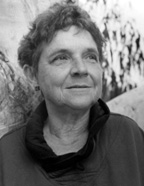 And if I’ve written in passion,Live, Julia! what was I writingbut my own pledge to myselfwhere the love of women is rooted?And what was I invokingbut the matrices we weaveweb upon web, delicate raftersflung in audacity to the prairie skies(from “For Julia in Nebraska,” in A Wild Patience Has Taken Me This Far)Adrienne Rich, the poet whose work exemplified the journey of twentieth century feminists to find an authentic individual and collective voice, died March 27th at 82. Her groundbreaking collection, The Dream of a Common Language, spoke to the soul of the emerging vision of women’s poetry. Her nonfiction work, Of Women Born took on the sentimentalized and trivialized subject of motherhood and examined it as a central influence on women’s lives and perspective.I did not know Rich, although I heard her perform many times. I chatted briefly with her once after a reading, and I recognized her occasionally in San Francisco or Santa Cruz – too shy to go up and speak to her, though she seemed open and approachable. Rich did not exude any air of self-importance, despite being recognized and celebrated as a gifted writer from an early age. Rich did, however, convey a sense that we – each of us women – were vitally important.The salient experience of being female in Western patriarchy is one of unimportance. Our thoughts, our feelings, our needs, our hopes, what we do, what we say, what happens to us – all are uninteresting, unimportant and irrelevant. If we sound shrill at times – to men, to other women, even to ourselves – it’s because we always feel like we’re never being heard.And Rich wrote as if she heard us. Rich could make the word “we” seem not like a conglomeration of unnamed entities but a symbiotic web of nourishment. She carried the conviction of our central, vital, incontrovertible importance. Not in spite of being women, but because.Rich was not, however, an unwavering source of upliftment. There was too much pain in her work. She suffered most of her life with arthritis, yet the pain that came through her work was an emotional one, almost an impersonal one, the pain of humanity and especially of women. It was too much to take in heavy doses, and I found myself drifting away from Rich’s poetry – and then being pulled back occasionally to the strength of that conviction: that our deeds, our experiences and our dreams are vital to the continuity of history – and to all that lies ahead.
And if I’ve written in passion,Live, Julia! what was I writingbut my own pledge to myselfwhere the love of women is rooted?And what was I invokingbut the matrices we weaveweb upon web, delicate raftersflung in audacity to the prairie skies(from “For Julia in Nebraska,” in A Wild Patience Has Taken Me This Far)Adrienne Rich, the poet whose work exemplified the journey of twentieth century feminists to find an authentic individual and collective voice, died March 27th at 82. Her groundbreaking collection, The Dream of a Common Language, spoke to the soul of the emerging vision of women’s poetry. Her nonfiction work, Of Women Born took on the sentimentalized and trivialized subject of motherhood and examined it as a central influence on women’s lives and perspective.I did not know Rich, although I heard her perform many times. I chatted briefly with her once after a reading, and I recognized her occasionally in San Francisco or Santa Cruz – too shy to go up and speak to her, though she seemed open and approachable. Rich did not exude any air of self-importance, despite being recognized and celebrated as a gifted writer from an early age. Rich did, however, convey a sense that we – each of us women – were vitally important.The salient experience of being female in Western patriarchy is one of unimportance. Our thoughts, our feelings, our needs, our hopes, what we do, what we say, what happens to us – all are uninteresting, unimportant and irrelevant. If we sound shrill at times – to men, to other women, even to ourselves – it’s because we always feel like we’re never being heard.And Rich wrote as if she heard us. Rich could make the word “we” seem not like a conglomeration of unnamed entities but a symbiotic web of nourishment. She carried the conviction of our central, vital, incontrovertible importance. Not in spite of being women, but because.Rich was not, however, an unwavering source of upliftment. There was too much pain in her work. She suffered most of her life with arthritis, yet the pain that came through her work was an emotional one, almost an impersonal one, the pain of humanity and especially of women. It was too much to take in heavy doses, and I found myself drifting away from Rich’s poetry – and then being pulled back occasionally to the strength of that conviction: that our deeds, our experiences and our dreams are vital to the continuity of history – and to all that lies ahead.
